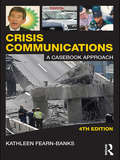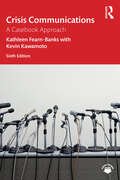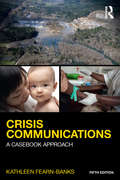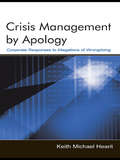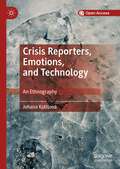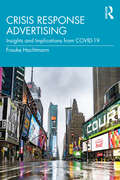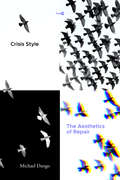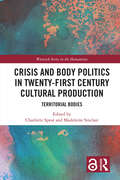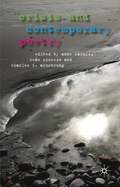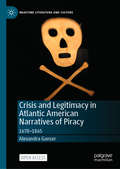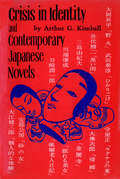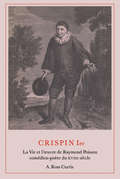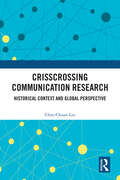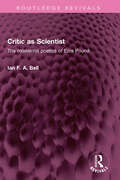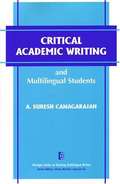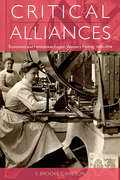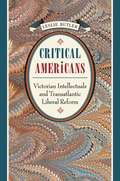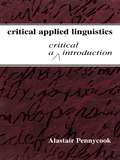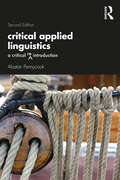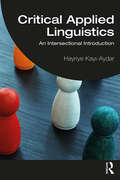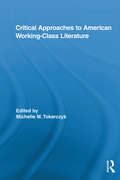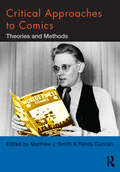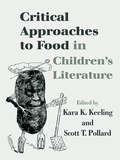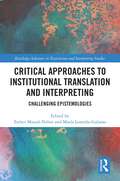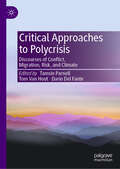- Table View
- List View
Crisis Communications
by Kathleen Fearn-BanksCrisis Communications: A Casebook Approach presents case studies of organizational, corporate, and individual crises, and analyzes the communication responses to these situations. Demonstrating how professionals prepare for and respond to crises, as well as how they develop communications plans, this essential text explores crucial issues concerning communication with the news media, employees, and consumers in times of crisis. Author Kathleen Fearn-Banks examines the steps of choosing the appropriate words to convey a message, selecting the method and channels for delivering the message, and identifying and targeting the most appropriate publics or audiences. She also addresses such important topics as avoiding potential mismanagement of communication in crisis situations. Key features of this fourth edition are: six new cases, including several international crises current discussion of communications technology as it relates to crises a Companion Website -- www.routledge.com/textbooks/fearn-banks -- with additional cases as well as supplemental materials for students and classroom resources for instructors. A Student Workbook is also available for use with this volume, providing additional pedagogy for each chapter, including discussion questions, activities, key terms, case exercises, and worksheets. Utilizing both classic and contemporary cases of real-world situations, Crisis Communications provides students in public relations and business with real-world perspectives and valuable insights for professional responses to crises. It is intended for use in crisis communications, crisis management, and PR case studies courses.
Crisis Communications: A Casebook Approach (ISSN)
by Kathleen Fearn-Banks Kevin KawamotoNow in its sixth edition, this book provides engaging, practice-oriented case studies analyzing communication professionals’ crisis preparation and responses, illustrating key considerations for communicating with both internal and external stakeholders during and after a crisis.This edition continues its strength as a student-friendly text that demonstrates how to craft, target, and deliver messages during crises in order to mitigate further controversy and distress. Classic cases lay the foundation, while contemporary cases shed light on cutting-edge practices in use today. Many cases from previous editions have been updated and new cases added, including the COVID-19 crisis and U.S. vaccination campaign; Starbucks and racial discrimination at a Philadelphia branch; Will Smith and the Academiy Awards slap; Gander, Newfoundland in supporting stranded tourists after the attacks of September 11, 2001; and a look at how schools can prepare communication responses to school shootings. Each case pays particular attention to the actual and ideal use of social media in the crisis and there is a new section on the important issues of misinformation and disinformation.Crisis Communications, 6th Edition is intended for courses in crisis communication, crisis management, disaster response, corporate communications, and public relations.Student and instructor online support materials feature selected previous editions’ case studies no longer in this edition as well as an Instructor’s Manual with suggested activities, discussion questions, and sample quizzes: www.routledge.com/9780367894450.
Crisis Communications: A Casebook Approach (Routledge Communication Series)
by Kathleen Fearn-BanksCrisis Communications: A Casebook Approach presents case studies of organizational, corporate, and individual crises, and analyzes the communication responses to these situations. Demonstrating how professionals prepare for and respond to crises, as well as how they develop communications plans, this essential text explores crucial issues concerning communication with the news media, employees, and consumers in times of crisis. Author Kathleen Fearn-Banks addresses how to choose the best possible words to convey a message, the best method for delivering the message, and the precise and most appropriate audience, in addition to illustrating how to avoid potential mismanagement. The fifth edition of Crisis Communications includes updated cases that provide wider coverage of international crises and media technologies. It includes a new section on social media in crisis communication scenarios and includes additional comments from social media experts throughout various chapters. New case studies include "Police Departments and Community Trust," "The Oso Mudslide in Washington," "School Shootings: Communications To and For Children," and two additional international case studies - "Ebola Strikes Liberia: Firestone Strikes Ebola" and "Nut Rage and Korean Airlines." Previous case studies no longer in this edition can be found on the book’s companion website, which also includes the Instructor’s Manual with exercises in crisis responses, guidelines for crisis manual preparation, and other teaching tools: www.routledge.com/cw/fearn-banks. Looking at both classic and modern cases in real-world situations, Crisis Communications provides students with real-world perspectives and insights for professional responses to crises. It is intended for use in crisis communications, crisis management, and PR case studies courses. Also available for use with this text is the Student Workbook to Accompany Crisis Communications, providing additional discussion questions, activities, key terms, case exercises, and further content for each chapter.
Crisis Management By Apology: Corporate Response to Allegations of Wrongdoing (Routledge Communication Series)
by Keith Michael HearitThis volume examines the role of apologia and apology in response to public attack. Author Keith Michael Hearit provides an introduction to these common components of public life, and considers a diverse list of subjects, from public figures and individuals to corporations and institutions. He explores the motivations and rationales behind apologies, and considers the ethics and legal liabilities of these actions. Hearit provides case studies throughout the volume, with many familiar examples from recent events in the United States, as well as an international apology-making case from Japan.The broad-perspective approach of this volume makes the content relevant and appealing to practitioners and scholars in public relations, business communications, and management. It is a valuable text for courses that take a discursive approach to public relations, and it also appeals to readers in business management, examining apology as a response strategy to corporate crises.
Crisis Reporters, Emotions, and Technology: An Ethnography
by Johana KotišováThis open access book explores the emotional labour of crisis reporters in an original style that combines fictional and factual narrative. Exploring how journalists make sense of their emotional experience and development in relation to their professional ideology, it illustrates how media professionals learn to think and act within crisis situations. Drawing on in-depth interviews with journalists reporting on wars, terror attacks and natural disasters, the book rethinks traditional concepts in journalistic thought. Finally, it reflects on the specific, contemporary vulnerabilities of industry professionals, including the impact of new technologies, specific forms of precarity, and a particular strain of cynicism central to the industry. Combining comprehensive, empirical research with the fictional narrative of a journalist protagonist, Crisis Reporters, Emotions and Technology establishes an innovative approach to academic storytelling.
Crisis Response Advertising: Insights and Implications from COVID-19
by Frauke HachtmannThis book examines the effects of COVID-19 on the advertising industry to better understand crisis response advertising.The book tells the story of three distinct phases in which the pandemic unfolded, the way a wide range of brands and agencies responded, and how the consumer landscape changed during the first 15 months of the crisis. Advertising professionals from a broad range of award-winning advertising agencies across the United States who experienced the crisis first-hand reflect on how COVID-19 disrupted the industry and what they learned along the way. Each case contains themes that emerged through data analysis, along with examples of advertising practice at various stages of the pandemic. Importantly, the new theoretical model and best practices covered in the book extend beyond application to the global pandemic, giving readers solid theoretical and practical tools to use in future crises.Suited for upper-level undergraduate and post-graduate courses in advertising and marketing, this book will be useful as a reference for researchers and is practical enough for practitioner use as well.
Crisis Style: The Aesthetics of Repair (Post*45)
by Michael DangoIn this expansive and provocative new work, Michael Dango theorizes how aesthetic style manages crisis—and why taking crisis seriously means taking aesthetics seriously. Detoxing, filtering, bingeing, and ghosting: these are four actions that have come to define how people deal with the stress of living in a world that seems in permanent crisis. As Dango argues, they can also be used to describe contemporary art and literature. Employing what he calls "promiscuous archives," Dango traverses media and re-shuffles literary and art historical genealogies to make his case. The book discusses social media filters alongside the minimalism of Donald Judd and La Monte Young and the television shows The West Wing and True Detective. It reflects on the modernist cuisine of Ferran Adrià and the fashion design of Issey Miyake. And, it dissects writing by Barbara Browning, William S. Burroughs, Raymond Carver, Mark Danielewski, Jennifer Egan, Tao Lin, David Mitchell, Joyce Carol Oates, Mary Robison, and Zadie Smith. Unpacking how the styles of these works detox, filter, binge, or ghost their worlds, Crisis Style is at once a taxonomy of contemporary cultural production and a theorization of action in a world always in need of repair. Ultimately, Dango presents a compelling argument for why we need aesthetic theory to understand what we're doing in our world today.
Crisis and Body Politics in Twenty-First Century Cultural Production: Territorial Bodies (Warwick Series in the Humanities)
by Charlotte Spear Madeleine SinclairThe twenty-first century has been deemed the “Age of Crisis”. We are witnessing the catastrophic unfolding of environmental crisis, financial crisis, pandemic and conflict. But are we to understand these crises as new phenomena? Is their seemingly simultaneous existence purely coincidental? Or rather do they instead form part of a singular, historically produced, unfolding crisis, which only today has reached a generalised consciousness? And perhaps most urgently, how far can we separate the crises of human experience from those exacted upon the land?The chapters collected in Crisis and Body Politics in Twenty-First Century Cultural Production: Territorial Bodies deploy the framework of “Territorial Bodies” to address urgent social, ecological and political challenges. Examining themes such as (inter)national bodily governance, racialised bodies, eco-feminist movements, spatial justice and bodily displacement, this collection provides a deeper analysis of the interconnected forms of violence perpetrated against marginalised human and non-human bodies, taking this combined violence as the defining feature of contemporary crisis.
Crisis and Contemporary Poetry
by Anne Karhio Seán Crosson Charles I. ArmstrongWhat are the means available to poetry to address crisis and how can both poets and critics meet the conflicts and challenges they face? This collection of essays addresses poetic and critical responses to the various crises encountered by contemporary writers and our society, from the Holocaust to the ecological crisis.
Crisis and Legitimacy in Atlantic American Narratives of Piracy: 1678-1865 (Maritime Literature and Culture)
by Alexandra GanserThis Open Access book, Crisis and Legitimacy in Atlantic American Narratives of Piracy: 1678-1865, examines literary and visual representations of piracy beginning with A.O. Exquemelin’s 1678 Buccaneers of America and ending at the onset of the US-American Civil War. Examining both canonical and understudied texts—from Puritan sermons, James Fenimore Cooper’s The Red Rover, and Herman Melville’s “Benito Cereno” to the popular cross-dressing female pirate novelette Fanny Campbell, and satirical decorated Union envelopes, this book argues that piracy acted as a trope to negotiate ideas of legitimacy in the contexts of U.S. colonialism, nationalism, and expansionism. The readings demonstrate how pirates were invoked in transatlantic literary production at times when dominant conceptions of legitimacy, built upon categorizations of race, class, and gender, had come into crisis. As popular and mobile maritime outlaw figures, it is suggested, pirates asked questions about might and right at critical moments of Atlantic history.
Crisis in Identity
by Arthur G. KimballThis book is intended to encourage the reading, study, and appreciation of contemporary Japanese fiction and, through it, an understanding of Japan and Japanese culture. The various chapters, including the Syllabus at the end, aim to stimulate and encourage general readers and students to deepen their knowledge of the available literature. The Syllabus in particular aims to encourage the teaching of Japanese literature in the classroom, at both high school and university level, by supplying the teacher and student with study aids. The book is based on an important and much-discussed contemporary theme, that of identity.
Crispien Ier: La Vie et l'œuvre de Raymond Poisson comédien-poète du XVIIe siècle
by A. Ross CurtisRaymond Poisson, a contemporary of Molière, was the leading comic actor with the troupe of the Hôtel de Bourgogne and later at the Comédie Française during the first five years of its existence. He popularized one of the French stage's best-loved stock characters, the impudent servant Crispin, while finding time to supply his troupe with short comedies in which he himself starred. This study is thoroughly documented and reflects the author's detailed knowledge of, and interest in, the period. It establishes Poisson's place in theatrical history, and illuminates a whole tradition in French theatre in the seventeenth century.
Crisscrossing Communication Research: Historical Context and Global Perspective
by Chin-Chuan LeeDrawing on studies of international communication and late Qing and Republican newspapers, this book examines the intellectual and practical development of communication from a global and historical perspective.The book is organized in two parts. The first part explores the “domestication” and fragmentation of communication studies, examining how domestic communication paradigms have been transformed into “refined mediocrity” and how international communication is now included in discussions of “modern theory”. Focusing on the newspapers of China’s Republican era, the second part explores the history of journalism from a variety of perspectives and addresses several key research issues. By exploring ways to connect theories in the humanities and social sciences, bridging the gap between Eastern and Western cultures, and interweaving case studies and macro-level theorizing, the author shows that communication analysis is necessarily dialectical, specific, complementary, and conditional. The book sheds important light on how acting locally while thinking globally can help us reconstruct the epistemological and methodological foundations of international communication.The title will appeal to scholars and students in communication studies, journalism, and the social sciences, especially those interested in international communication.
Critic as Scientist: The modernist poetics of Ezra Pound (Routledge Revivals)
by Ian F. BellFirst published in 1981, Critic as Scientist provides a detailed and scholarly account both of the scientific background and of contemporary artistic issues in its analysis of Ezra Pound’s poetics. During the crucial period of his years in London, Ezra Pound was striving to formulate not only a new system of poetics but also a new language through which he could both define the critic’s procedure and announce his modernity. It was in science that Pound discovered the vocabulary that became his most characteristic gesture during the literary crises of the time. The use of scientific terminology in his ‘propaganda’ for a new ‘renaissance’ belonged, initially, to specifically American modes of aesthetic tradition, as typified by Whistler and aspects of New England transcendentalism. A consideration of popular versions of physics and biology, and of the ‘scientific attitude’ displayed by such contemporaries as Fenollosa, Hulme, Ford and Eliot, reveals that the major terms and practices of Pound’s critical vocabulary were located in the issues of nineteenth and early twentieth-century science. The author has sought to demystify key words in the Poundian vocabulary and has suggested a wider literary and cultural context for the study of Pound’s aesthetic theory. This book will be of interest to students of literature.
Critical Academic Writing and Multilingual Students
by Canagarajah A. SureshThe critical approach to L2 writing is arguably one of the most significant recent developments in L2 writing pedagogy. A. Suresh Canagarajah provides a thorough discussion of this topic in Critical Academic Writing and Multilingual Students. This volume facilitates teacher self-reflection and enables readers to better understand the motivations and pedagogical implications--especially for L2 writing--of a more openly pedagogical approach. Critical Academic Writing and Multilingual Students explains what it means to commit to an academic pedagogy, in terms of form, self, content, and community--and what it can accomplish in the L2 writing classroom. It's a guide for writing teachers who wish to embark on a journey toward increased critical awareness of the role they play, or potentially could play, in the lives of their students.
Critical Alliances: Economics and Feminism in English Women’s Writing, 1880–1914
by S. Brooke CameronCritical Alliances argues that late-Victorian and modernist feminist authors saw in literary representations of female collaboration an opportunity to produce new gender and economic roles for women. It is not often that one thinks of female allegiances – such as kinship networks, cultural inheritance, or lesbian marriage – as influencing the marketplace; nor does one often think of economic models when theorizing feminist cooperation. S. Brooke Cameron suggest that, through their representations of female partnership, feminist authors such as Virginia Woolf, Olive Schreiner, George Egerton, Amy Levy, and Michael Field redefined the gendered marketplace and, with it, women’s professional opportunities. Interdisciplinary at its core and using a contextual approach, Critical Alliances selects cultural texts and theories relevant to each writer’s particular intervention in the marketplace. Chapters look at how different forms of feminist collaboration enabled women to stake their claim to one of the many, emergent professions at the turn of the century.
Critical Americans
by Leslie ButlerIn this intellectual history of American liberalism during the second half of the nineteenth century, Leslie Butler examines a group of nationally prominent and internationally oriented writers who sustained an American tradition of self-consciously progressive and cosmopolitan reform. She addresses how these men established a critical perspective on American racism, materialism, and jingoism in the decades between the 1850s and the 1890s while she recaptures their insistence on the ability of ordinary citizens to work toward their limitless potential as intelligent and moral human beings.At the core of Butler's study are the writers George William Curtis, Thomas Wentworth Higginson, James Russell Lowell, and Charles Eliot Norton, a quartet of friends who would together define the humane liberalism of America's late Victorian middle class. In creative engagement with such British intellectuals as John Stuart Mill, Thomas Carlyle, Matthew Arnold, Leslie Stephen, John Ruskin, James Bryce, and Goldwin Smith, these "critical Americans" articulated political ideals and cultural standards to suit the burgeoning mass democracy the Civil War had created. This transatlantic framework informed their notions of educative citizenship, print-based democratic politics, critically informed cultural dissemination, and a temperate, deliberative foreign policy. Butler argues that a careful reexamination of these strands of late nineteenth-century liberalism can help enrich a revitalized liberal tradition at the outset of the twenty-first century.
Critical Applied Linguistics: A Critical Introduction
by Alastair PennycookThis accessible guide and introduction to critical applied linguistics provides a clear overview, highlighting problems, debates, and competing views in language education, literacy, discourse analysis, language in the workplace, translation and other language-related domains. Covering both critical theory and domains of practice, the book is organized around five themes: the politics of knowledge, the politics of language, the politics of texts, the politics of pedagogy, and the politics of difference. It is an important text for anyone involved in applied linguistics, TESOL, language education, or other language-related fields.
Critical Applied Linguistics: A Critical Re-Introduction
by Alastair PennycookNow in its second edition, this accessible guide and introduction to critical applied linguistics provides a clear overview of the problems, debates, and competing views in language education, literacy, discourse analysis, language in the workplace, translation, and other language-related domains. Covering both critical theory and domains of practice, the book is organized around five themes: the politics of knowledge, the politics of language, the politics of difference, the politics of texts, and the politics of pedagogy. Recognizing that a changing world requires new ways of thinking, and that many approaches have watered down over time, the new edition applies a sharp, fresh look at established and new intellectual frameworks. The second edition is comprehensively updated with additional research throughout and features new discussions of colonialism, queer theory, race and gender, translanguaging, and posthumanism. With a critical focus on the role of applied linguists, Pennycook emphasizes the importance of a situated, collaborative perspective that takes the discussion away from questions of implementation, and insists instead that critical applied linguistics has to be an emergent program from the contexts in which it works. This landmark text is essential reading for students and researchers of applied linguistics, multilingualism, language and education, TESOL, and language and identity.
Critical Applied Linguistics: An Intersectional Introduction
by Hayriye Kayı-AydarThis highly accessible, up-to-date introduction provides an overview of critical applied linguistics through an intersectionality framework. The book reflects recent developments through a discussion and evaluation of key questions, diverse perspectives, and practices for social change. As it unpacks different forms of marginalization and privilege, it relates them to language use, critical pedagogies, and critical intersectional advocacy in applied linguistics. This book is a source of reference for all applied linguists; undergraduate/graduate students in applied linguistics, TESOL, and other relevant programs; classroom teachers; and language teacher educators. It aims to foster critical reflection, critical thinking, and intersectional advocacy. Examples, suggested readings, discussion questions, and questions for reflection not only help personalize the content but also enable the reader to further understand what motivates research, critical practice, and social action in critical applied linguistics.
Critical Approaches to American Working-Class Literature (Routledge Studies in Twentieth-Century Literature)
by Michelle M. TokarczykThis book is one of the first collections on a neglected field in American literature: that written by and about the working-class. Examining literature from the 1850s to the present, contributors use a wide variety of critical approaches, expanding readers’ understanding of the critical lenses that can be applied to working-class literature. Drawing upon theories of media studies, postcolonial studies, cultural geography, and masculinity studies, the essays consider slave narratives, contemporary poetry and fiction, Depression-era newspaper plays, and ethnic American literature. Depicting the ways that working-class writers render the lives, the volume explores the question of what difference class makes, and how it intersects with gender, race, ethnicity, and geographical location.
Critical Approaches to Comics: Theories and Methods
by Matthew J. Smith Randy DuncanCritical Approaches to Comics offers students a deeper understanding of the artistic and cultural significance of comic books and graphic novels by introducing key theories and critical methods for analyzing comics. Each chapter explains and then demonstrates a critical method or approach, which students can then apply to interrogate and critique the meanings and forms of comic books, graphic novels, and other sequential art. The authors introduce a wide range of critical perspectives on comics, including fandom, genre, intertextuality, adaptation, gender, narrative, formalism, visual culture, and much more. As the first comprehensive introduction to critical methods for studying comics, Critical Approaches to Comics is the ideal textbook for a variety of courses in comics studies. Contributors: Henry Jenkins, David Berona, Joseph Witek, Randy Duncan, Marc Singer, Pascal Lefevre, Andrei Molotiu, Jeff McLaughlin, Amy Kiste Nyberg, Christopher Murray, Mark Rogers, Ian Gordon, Stanford Carpenter, Matthew J. Smith, Brad J. Ricca, Peter Coogan, Leonard Rifas, Jennifer K. Stuller, Ana Merino, Mel Gibson, Jeffrey A. Brown, Brian Swafford
Critical Approaches to Food in Children's Literature (Children's Literature and Culture #Vol. 59)
by Kara K. Keeling Scott T. PollardCritical Approaches to Food in Children’s Literature is the first scholarly volume on the topic, connecting children's literature to the burgeoning discipline of food studies. Following the lead of historians like Mark Kurlansky, Jeffrey Pilcher and Massimo Montanari, who use food as a fundamental node for understanding history, the essays in this volume present food as a multivalent signifier in children’s literature, and make a strong argument for its central place in literature and literary theory. Written by some of the most respected scholars in the field, the essays between these covers tackle texts from the nineteenth century (Rudyard Kipling’s Kim) to the contemporary (Dave Pilkey’s Captain Underpants series), the U.S. multicultural (Asian-American) to the international (Ireland, Brazil, Mexico). Spanning genres such as picture books, chapter books, popular media, and children’s cookbooks, contributors utilize a variety of approaches, including archival research, cultural studies, formalism, gender studies, post-colonialism, post-structuralism, race studies, structuralism, and theology. Innovative and wide-ranging, Critical Approaches to Food in Children’s Literature provides us with a critical opportunity to puzzle out the significance of food in children’s literature.
Critical Approaches to Institutional Translation and Interpreting: Challenging Epistemologies (ISSN)
by María Lomeña-GalianoThis collection re-envisions the academic study of institutional translation and interpreting (ITI), uncovering the ways in which institutional practices have inhibited knowledge creation and encouraging stakeholders to continue to challenge the assumptions and epistemics which underpin the field.ITI is broadly conceived here as translation and interpreting delivered in or for specific organizations and institutional social systems, spanning national, supranational, and international organizations as well as financial markers, universities, and national courts. This volume is organized around three sections, which collectively interrogate the knower – the field itself – to engage in questions around “how we know what we know” in ITI and how institutions have contributed to or hindered the social practice of knowledge creation in ITI studies. The first section challenges the paths which have led to current epistemologies of ignorance while the second turns the critical lens on specific institutional practices. The final section explores specific proposals to challenge existing epistemologies by broadening the scope of ITI studies.Giving a platform to perspectives which have been historically marginalized within ITI studies and new paths to continue challenging dominant assumptions, this book will appeal to scholars and policymakers in translation and interpreting studies.
Critical Approaches to Polycrisis: Discourses of Conflict, Migration, Risk, and Climate
by Tom Van Hout Tamsin Parnell Dario Del FanteThis book critically examines how polycrisis is recontextualised and (ab)used in contemporary discourse from across Europe. The book brings together established and emerging researchers in the field of discourse studies from around the world to explore the accelerating interconnected challenges of climate change, conflict, risk, Brexit, democracy, COVID-19, the rising cost of living, and migration. Recognising that polycrisis is socially produced, constructed and dismantled through discourse, the authors contemplate the discursive manifestations of crisis. Falling under the banner of critical discourse studies (CDS), the methodological approaches are heterogeneous, including, but not limited to, corpus-assisted CDS and multimodal CDS. The data are equally varied, ranging from focus groups to no-war letters, media representations to environmental protection commercials. The volume provides a comprehensive consideration of how critical approaches to discourse can help to make sense of, resist, and respond to (poly)crisis, and it will be of interest to students and scholars working in the remit of discourse studies, with a particular interest in crisis communication.
